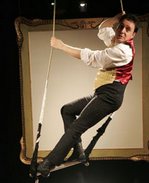SITE GUIDE
SEARCH
REVIEWS
REVIEW ARCHIVES
ADVERTISING AT CURTAINUP
FEATURES
NEWS
Etcetera and
Short Term Listings
LISTINGS
Broadway
Off-Broadway
NYC Restaurants
BOOKS and CDs
OTHER PLACES
Berkshires
London
California
New Jersey
DC
Connecticut
Philadelphia
Elsewhere
QUOTES
TKTS
PLAYWRIGHTS' ALBUMS
LETTERS TO EDITOR
FILM
LINKS
MISCELLANEOUS
Free Updates
Masthead
A CurtainUp Review
Merrick - The Elephant Man
| Tonight's show is about a man, a human being just like you or me. And despite his rather challenging outward appearance, I would ask that you please try to contain your emotions and have the generosity of spirit to remember that the beast you shall see before you is no beast, but a human being possessed of the same blessed spirit as you or I. — Tom Norman
|

Saul Jaffe in Merrick, The Elephant Man
(Photo: Ben King) |
With director/co-writer Mary Swan, Jaffé re-examines the well-known story which has been interpreted in theaters and as an Academy Award winning film. In little over one hour, Jaffé and Swan skim through dates and details to stress the emotional journey of Merrick whose affliction, Proteus syndrome, was so deforming that he was seen as an object of curiosity, horror and revulsion. He lived in constant pain and loneliness. Born perfect, the indications of abnormality appeared around age two, when as Jaffe as Merrick says, "The monster pushed its way out of me.". Parts of his body grew uncontrollable. Lumps appeared on his head, his mouth could not shut, his fingers and feet became swollen and one leg was distorted. The severely deformed man never even found solace in sleep because he could only rest in a chair, bent forward with his huge head against his knees.
Jaffé morphs into Merrick without masks and makeup, using only his body, vocal changes, some props and the audience's imagination. He also portrays several minor characters: Tom Norman, a carnival entrepreneur and narrator, the stepmother who beat him, and Dr. Treves who graphically describes Merrick's condition. In one heartbreaking segment, the doctor tells Merrick that The London Hospital has no place for him. It is not until later, when Dr. Treves finds Merrick beaten and robbed, that he convinces the hospital to admit him for observation. Ironically, though he could never be cured, it's Merrick's very deformity that saves him through fame and funding. Living in the hospital, he finds personal comfort and greets curious visitors. A titled noblewoman even offers a him a vacation on her large estate. There, alone in the country, he absorbs the joys of nature and reflects about the life he has led.
The show opens on an upbeat note, with Jaffé as Tom Norman bounding affably onstage. This slick chap interacts with the audience and it's his job to prepare us for the story of Joseph Merrick, his prize carnival "freak" attraction. His confident comic timing and his appearances as Norman balances the bleakness of Merrick's situation. He lets us know not only that we are in for some uncomfortable moments but that Merrick is a human being and a man to be respected as such.
Jaffé's energy never lags and his transformation into Merrick is sharp and smooth. He muffles his voice, repositions his head and drapes his form with slow, careful shifts. At one point he twists himself around a hanging trapeze to demonstrate his awkward sleeping position.
Director Mary Swan keeps a flowing interplay of humor and anguish to tell the story of Merrick's short life. One segment uses an overhead video projector to artistically trace his European tour. An imaginative touch follows the death of Merrick's younger brother, when seven-year-old Joseph picks up a white cloth and folds it into an angel, manipulating it on its flight.
The script is limited but its theatricality comes from the selective use of the story and Saul Jaffé's performance with its use of trapeze, a hospital screen, a dressmaker's dummy, a watermelon, and a chaise as story propelling props. This show, first presented by Proteus Theatre Company at the 2008 Edinburgh Fringe Festival, is not The Elephant Man familiar to so many of us, but it delivers an impressive span of emotion and depth.
|
Merrick, The Elephant Man
By Mary Swan and Saul Jaffé Directed by Mary Swan Cast: Saul Jaffé Set Design: Sam Pine Aerial Choreography: Lorraine Moynehan Lighting Design: Simon Beckett Music Design: Paul Wild Running Time: 75 minutes, no intermission Proteus Theatre Company as part of Brits Off-Broadway Festival at 59East59 Theaters. (212) 246 – 4422 Tickets: ($25) Members $17.50. Performances: Tuesday at 7:30 PM; Wednesday-Saturday at 8:30 PM; Wednesday and Saturday at 2:30 PM and Sunday at 3:30 PM and 7:30PM. From 11/24/09. Opens 12/01/09. Closes 12/13/09. Review by Elizabeth Ahlfors based on performance 11/28/09 |
|
REVIEW FEEDBACK Highlight one of the responses below and click "copy" or"CTRL+C"
Paste the highlighted text into the subject line (CTRL+ V): Feel free to add detailed comments in the body of the email. . .also the names and emails of any friends to whom you'd like us to forward a copy of this review. You can also contact us at Curtainup at Facebook , Curtainup at Twitter and at our Blog Annex |
|
Subscribe to our FREE email updates with a note from editor Elyse Sommer about additions to the website -- with main page hot links to the latest features posted at our numerous locations. To subscribe,
E-mail: esommer@curtainup.comesommer@curtainup.com
put SUBSCRIBE CURTAINUP EMAIL UPDATE in the subject line and your full name and email address in the body of the message -- if you can spare a minute, tell us how you came to CurtainUp and from what part of the country. |






